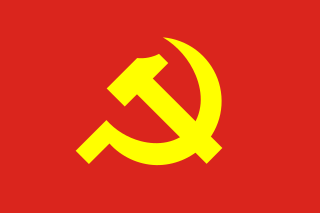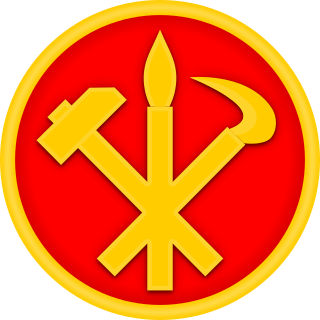
The Socialist Unity Party of Germany, often known in English as the East German Communist Party, was the governing Marxist–Leninist political party of the German Democratic Republic from the country's foundation in October 1949 until its dissolution after the Peaceful Revolution in 1989. The party was established in April 1946.

Not to be confused with The National People's Congress of the People's Republic of China

The Central Committee of the Communist Party of China is a political body that comprises the top leaders of the Communist Party of China (CPC). It is currently composed of 205 full members and 171 alternate members. Members are nominally elected once every five years by the National Congress of the Communist Party of China. In practice, the selection process is done privately, usually through consultation of the party's Politburo and its corresponding Standing Committee.

The Communist Party of Vietnam (CPV) is the founding and ruling communist party of the Socialist Republic of Vietnam. Although it nominally exists alongside the Vietnamese Fatherland Front, it maintains a unitary government and has centralised control over the state, military and media. The supremacy of the Communist Party is guaranteed by Article 4 of the national constitution. The CPV was founded in 1930 by Hồ Chí Minh and since 1945, it has been the only legal party in the country alongside the former South Vietnam when it took over in 1975 at the end of the Vietnam War. It also controls the military, the People's Army of Vietnam.

The Congress of the Communist Party of the Soviet Union was the supreme decision-making body of the Communist Party of the Soviet Union. Its meetings served as convention of all party delegates and their predecessors.

The 10th National Congress of the Communist Party of Vietnam was held in Ba Đình Hall, Hanoi from 18 to 25 April 2006. The congress occurs every five years. 1,176 delegates represented the party's 3 million members. At the 13th plenum of the Central Committee, held before the congress, it was decided that eight members of the Communist Party's 9th Politburo had to retire. While certain segments within and outside the Politburo were skeptical, the decision was implemented. Because of party rules, the congress was not empowered to elect the general secretary, and it held a survey on whom the delegates wanted to be appointed General Secretary. The first plenum of the Central Committee, held in the immediate aftermath of the congress, re-elected Nông Đức Mạnh as general secretary.

The General Secretary of the Central Committee of the Communist Party of Vietnam, known as First Secretary from 1951 to 1976, is the highest office within the Communist Party of Vietnam. The General Secretaryship was the second-highest office within the party when Hồ Chí Minh was Chairman, a post which existed from 1951 to 1969. The general secretary is also the Secretary of the Central Military Commission, the leading Party organ on military affairs. For a period in its history, the position of general secretary has been synonymous with the paramount leader of Vietnam. The current general secretary is Nguyễn Phú Trọng, and he is ranked first in the Politburo.
The 7th Central Committee of the Communist Party of China was in session from 1945 to 1956. It was a product of the convening of the 7th National Congress of the Communist Party of China. It held six plenary sessions in this 11 year period. It began in June 1945, before the end of the Second Sino-Japanese War, and the resumption of the Chinese Civil War. This committee would be succeeded by the 8th Central Committee.

The Political Bureau (Politburo) of the Central Committee Communist Party of Vietnam, formerly the Standing Committee of the Central Committee from 1930 to 1951, is the highest body of the Communist Party of Vietnam (CPV) between Central Committee meetings, which are held at least twice a year. According to Party rules, the Politburo directs the general orientation of the government and enacts policies which have been approved by either the National Party Congress or the Central Committee.

The Central Committee of the Workers' Party of Korea is the highest party body between WPK national meetings. According to WPK rules, the Central Committee is elected by the party congress and the party conference can be conferred the right to renew its membership composition. In practice, the Central Committee has the ability to dismiss and appoint new members without consulting with the wider party at its own plenary sessions.

The following is a list of national meetings of the Workers' Party of Korea. This article defines national meetings as party congresses and conferences of representatives. The party congress is nominally the highest body of the Workers' Party of Korea (WPK) according to its charter. The charter states specifically that it should convene at least every fifth year, however, the congress has never managed to be convened in that time frame. There was a gap of 36 years between the 6th Congress and the 7th Congress. However, two party conferences were convened in the period 2010–2012.

The 9th National Congress of the Communist Party of Vietnam was held in Ba Đình Hall, Hanoi from 19–22 April 2001. The congress occurs once every five years. A total of 1,168 delegates represented the party's 2,479,719 card-carrying members.

The 6th National Congress of the Communist Party of Vietnam (CPV) was held in Ba Đình Hall, Hanoi, between 15 and 18 December 1986. 1,129 delegates represented the party's estimated 1,900,000 members. The congress occurs once every five years. Preparations for the 6th National Congress began with 8th plenum of the 5th Central Committee and ended with the 10th plenum, which lasted 19 days. After the 10th plenum, local and provincial party organizations began electing delegates to the congress as well as updating party documents.

The National People's Congress is the highest organ of state power and the national legislature of the People's Republic of China. With 2,980 members in 2018, it is the largest parliamentary body in the world. The National People's Congress meets in full session for roughly two weeks each year and votes on important pieces of legislation. Members are considered to be part-time legislators and are not paid to serve in the NPC.

The Central Committee of the Communist Party of the Soviet Union was the executive leadership of the Communist Party of the Soviet Union, acting between sessions of Congress. According to party statutes, the committee directed all party and governmental activities. Its members were elected by the Party Congress.
The organization of the Communist Party of China (CPC) is based upon the Leninist idea of democratic centralism.

The Central Committee (CC) composition was elected by the 16th Congress, and sat from 13 July 1930 until 10 February 1934. Its 1st Plenary Session renewed the composition of the Politburo, Secretariat and the Orgburo of the All-Union Communist Party (Bolsheviks). The 16th Congress was the first party convention since the 13th Congress which saw no organized opposition, and the first congress in party history in which there was no opposition to the party leadership. Ukrainian historian Oleg Khlevniuk considers the period 1930–1934 to be a "transitional period" between collective leadership and Joseph Stalin's personal dictatorship (autocracy). The removal of Alexei Rykov, the Chairman of the Council of People's Commissars, from the Politburo at the 1st Joint Plenary Session of the CC and the Central Control Commission (CCC) has been marked in historic literature as "the definitive Stalinization of that body [Politburo]" according to Khlevniuk.

The 7th Congress of the Workers' Party of Korea (WPK), the ruling party of North Korea, was held on 6–9 May 2016.

The Congress of the Lao People's Revolutionary Party (LPRP) is the party's highest decision-making body. The LPRP has convened 10 congresses since its foundation in 1955, and eight since taking power in 1975. According to the party rules, the party congress is to be convened by the LPRP Central Committee (CC) every fifth year. It functions as a forum that approves party policy, is empowered to amend the party's charter and program, and elects the Central Committee. The party leadership, through the Political Report of the Central Committee, briefs the party on its work in the period since its last congress, and sets out future goals for the period in between the next congress.
The 12th Congress of the League of Communists of Yugoslavia was held from 26 to 29 June 1982, in the Belgrade Sava Centar. The highest organ of both the government and the party, it was the first Congress of League of Communists of Yugoslavia convened since Josip Broz Tito's death in 1980. It was attended by delegates from all the republics and provinces, as well as a party delegation from the Yugoslav People's Army.












